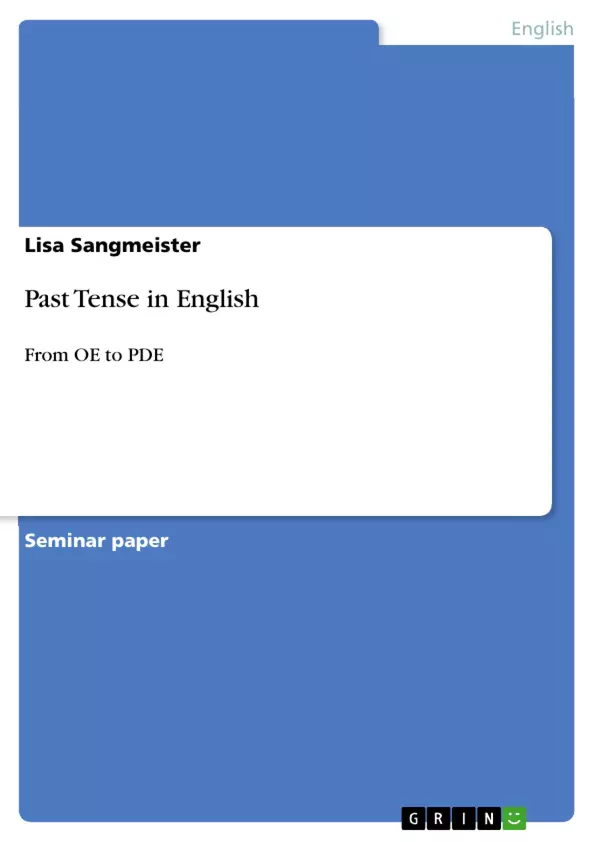Why do we say walked to express the past tense of walk? And what is the reason for saying brought as past tense of ‘to bring’ instead of *bringed? Where is the origin of what we know as irregular and regular verbs in Present-Day English? And how do we decide which tense is needed in certain situations? Which role do adverbials play in combination with past tense formation and usage? These are the questions which lead us through our term paper.
Table of Contents
- Introduction
- Periods of the English Language
- Old English
- Middle English
- Early Modern English
- Present-Day English
- Past Tense in PDE
- Time and Tense
- Ways to express Past Tense
- The Role of Adverbials
- The Formation of Past Tense
- Changes in the Verbal System
- Previous Periods - {-ed} vs. Ablaut
- Strong Verbs
- Weak Verbs
- Other Verbs
- The Tense System: An Overview
- Previous Periods - {-ed} vs. Ablaut
Objectives and Key Themes
This paper investigates the development of the past tense in English, tracing its evolution from Old English to Present-Day English. It explores the historical influences on the formation of regular and irregular verbs and examines the role of syntax and adverbials in expressing past tense.
- The historical development of the English language across different periods.
- The formation and usage of past tense in Present-Day English.
- The impact of historical linguistic changes on the modern past tense system.
- The role of adverbials in expressing past tense.
- The distinction between strong and weak verbs and their evolution.
Chapter Summaries
The Introduction sets the stage by posing key questions about past tense formation and usage, outlining the paper's structure and scope. The section on Periods of the English Language provides a brief overview of Old English, Middle English, Early Modern English, and Present-Day English, highlighting key historical events and linguistic changes in each period. The chapter on Past Tense in PDE describes the current state of past tense formation in English, including various ways of expressing past time and the function of adverbials. Finally, the section on Changes in the Verbal System delves into the historical evolution of strong and weak verbs, comparing their forms in earlier stages of English with their modern counterparts.
Keywords
Past tense, English language history, Old English, Middle English, Early Modern English, Present-Day English, strong verbs, weak verbs, regular verbs, irregular verbs, tense system, adverbials, morphological change, linguistic development.
Frequently Asked Questions
What is the difference between strong and weak verbs in English?
Strong verbs (irregular) form their past tense through a change in the stem vowel (Ablaut), like 'sing' to 'sang'. Weak verbs (regular) form their past tense by adding a suffix like '-ed', such as 'walk' to 'walked'.
How did the past tense evolve from Old English to Present-Day English?
The English verbal system has undergone significant morphological changes. While Old English had a complex system of strong verb classes, many of these became regularized (weak) over time, though some common irregular forms remain.
What role do adverbials play in expressing the past?
Adverbials of time (e.g., 'yesterday', 'last year') provide context and help specify when an action occurred, which is crucial for choosing the correct tense in English.
Why do we say 'brought' instead of 'bringed'?
'Brought' is an irregular past tense form that survives from earlier periods of the English language. These irregular forms often persist in high-frequency verbs despite the general trend toward regularization.
What are the major periods of the English language?
The history of English is typically divided into Old English, Middle English, Early Modern English, and Present-Day English (PDE).
- Citation du texte
- Lisa Sangmeister (Auteur), 2008, Past Tense in English, Munich, GRIN Verlag, https://www.grin.com/document/122404



